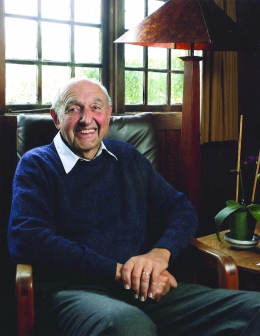Campus News
Alumni Weekend: Keynote speakers to explore the question of how we learn
A distinguished group of speakers will explore the question, “How do we learn?,” at an Alumni Weekend event that will range from virtual reality to adaptive learning techniques.

A distinguished group of speakers will explore the question, “How do we learn?,” at a brand-new Alumni Weekend event that will range from the world of virtual reality to the potentials of adaptive learning techniques and the importance of mentorship.
This TED Talks–style “welcome keynote” celebration will take place at 7 p.m., April 29, at the Stevenson Event Center. The talk will include the celebrated professor emeritus of American studies and founding UC Santa Cruz faculty member John Dizikes; notable alumni author Lawrence Weschler (Cowell ’74, philosophy and western civilization); and special guests, including psychology professor Steve Whittaker, a professor in human-computer interaction, and Ted Warburton, theater arts professor.
Alumni Weekend is April 28–May 1, 2016. Events are centered on campus, with some events in other nearby locations in the Santa Cruz area.
Dizikes, during his 35-year career at UC Santa Cruz, was a professor of history, a professor and co-founder of the American Studies Department, and a provost of Cowell College. He has a wide breadth of knowledge, and a passion for teaching and learning.
When he addresses the crowd that evening, Dizikes will draw from his long career, but he’ll also tap into the lessons he learned from his own mentors.
When asked to address the mystery of learning, Dizikes said there is no substitute for caring and attentive teachers who can engage and draw out students in a thoughtful way.
During his teaching career, he loved those “marvelous moments when the light went on in students’ eyes, and I could tell something had registered,” he said. “It’s important that you help them discover these things for themselves.”
Dizikes has had plenty of help along the way to this realization.
“I was blessed by innumerable helpful teachers who pushed things along, opened things up, and encouraged me to do things I never could have imagined,” Dizikes said.
The college years are “an impressionable age,” he continued. Some students struggle at first to find their place in a supercharged environment full of bright young minds.
“But I found that just saying to people, ‘Wait a minute, this is a good piece of work, but why don’t you think about this other aspect of it, or why don’t you reconsider this part?,’” he said. “That was enormously important, the intimate scale of those first 25 years. I got to know all the students.”
Lawrence Weschler spent more than 20 years as an award-winning writer for The New Yorker magazine. Weschler, the author of 14 books, has taught at UC Santa Cruz, as well as Princeton University, Columbia University, Bard College, Vassar College, Sarah Lawrence College, and New York University, where he is currently the director of the New York Institute for the Humanities.
“One thing you need to pick up across four years of college is how to learn, and one subset of that is how to ask questions, how to frame questions, and how to be in a questioning mode,” Weschler said. “If you come out of college with those skills, the rest of your life is a college education. You are in college so you can learn how to treat the rest of your life as an ongoing occasion for learning.”
Weschler will also join noted young Mexican-American artist Ramiro Gomez for a conversation at Stevenson Fireside Lounge before the keynote. The discussion begins at 4 p.m.
Weschler, whose recent profile of Gomez appeared in the New York Times, said that the artist, in an “extremely thoughtful” way, creates scenes of fancy homes so clean, well-managed and lavish “that the people who live in the houses must have an army of workers … who are disposable.”
In doing so, Gomez captures the vulnerability and humanity of workers on the margins.
“(Gomez) talks about the way domestic workers and undocumented workers often feel they don’t have the right to go into museums and galleries, that these places are not for them,” Weschler continued. “He is not only trying to draw attention to them but make them see that they are worthy of being part of the cultural dialogue.”